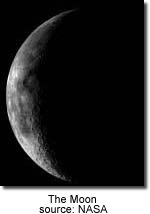
|
How
to Photograph This Month's Lunar Eclipse
|
Reprinted with permission from the New York Institute of Photography.
01/06/2000
 On
the night of January 20, a total lunar eclipse will be visible across all of
America. While lunar eclipses don't elicit the excitement of a solar eclipse
among many devotees of astronomy, it's still a great celestial event to watch.
"A lunar eclipse is also a great opportunity for photography," explains Chuck
DeLaney, Dean of the New York Institute of Photography. "Unlike a solar eclipse,
photographing the moon is easy and doesn't require complicated filters and excessive
precautions. So why not get out in the night air and try your hand at astrophotography?"
On
the night of January 20, a total lunar eclipse will be visible across all of
America. While lunar eclipses don't elicit the excitement of a solar eclipse
among many devotees of astronomy, it's still a great celestial event to watch.
"A lunar eclipse is also a great opportunity for photography," explains Chuck
DeLaney, Dean of the New York Institute of Photography. "Unlike a solar eclipse,
photographing the moon is easy and doesn't require complicated filters and excessive
precautions. So why not get out in the night air and try your hand at astrophotography?"
On the New York Institute of Photography's Website this month there is a comprehensive article on how to photograph both a full moon and the moon during a lunar eclipse. According to NYI, once the moon enters totality (which will be at 11:04pm in New York City and three hours earlier in San Francisco) put your camera on manual exposure. An exposure of 1 second at f/2.8 using ISO 400 speed film is a good starting place. NYI suggests that you'll need a tripod to steady your camera and you'll be wise to "bracket" your exposure by using a variety of exposure combinations to put different amounts of light on the film.
You don't need a monster telephoto lens to record the eclipse. While a 300mm lens with a tele-extender is a great tool for dramatic close-ups, you can also use a shorter lens and include some scenery in the frame. For example, a tree in silhouette can make a dramatic addition to an eclipse photo. If you live in a city, you may be able to include the skyline in your photo. NYI suggests that you study various outdoor locations for a night or two before the eclipse to decide how to make the most effective composition with your equipment, the moon's position, and the terrain in your neighborhood.
For a complete article on photographing the moon, along with information about the times of moon rise, the start of the eclipse and totality in your area, visit the New York Institute of Photography website.
| Total Lunar Eclipse of January 20, 2000 | |||||
| Event | GMT | EST | CST | MST | PST |
| Partial Eclipse Begins: | 03:01 AM* | 10:01 PM | 09:01 PM | 08:01 PM | 07:01 PM |
| Total Eclipse Begins: | 04:05 AM* | 11:05 PM | 10:05 PM | 09:05 PM | 08:05 PM |
| Mid-Eclipse: | 04:44 AM* | 11:44 PM | 10:44 PM | 09:44 PM | 08:44 PM |
| Total Eclipse Ends: | 05:22 AM* | 12:22 AM* | 11:22 PM | 10:22 PM | 09:22 PM |
| Partial Eclipse Ends: | 06:25 AM* | 01:25 AM* | 12:25 AM* | 11:25 PM | 10:25 PM |
|
* Event occurs on morning of January 21, 2000 GST - Greenwich
Mean Time |
|||||
Various other links with examples of eclipse photography:
|
(c)
1997-1999 herzlers' hideout
|
|
http://theastropages.com
|